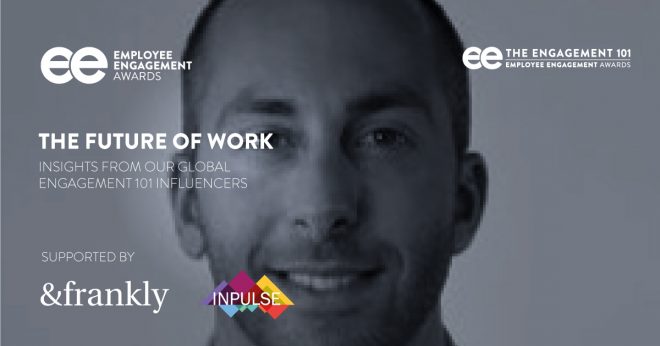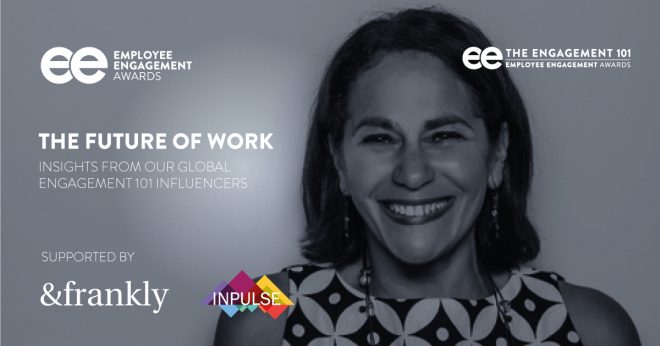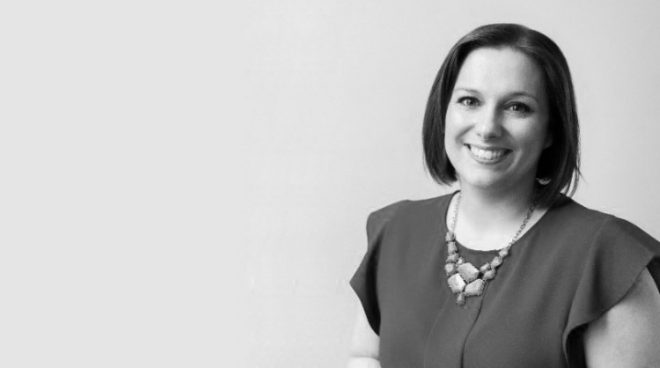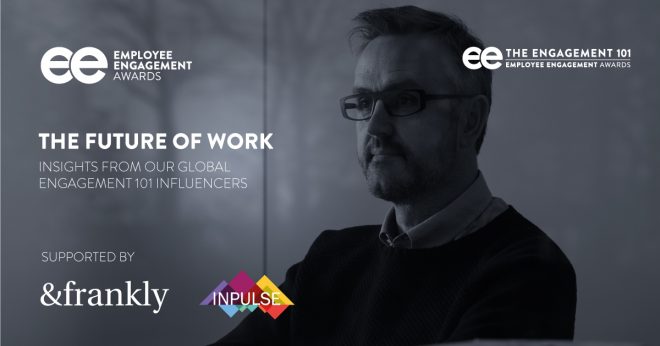
10th January 2024
Meet the 2024 Top Inspiring Workplaces Judges: David Ducheyne
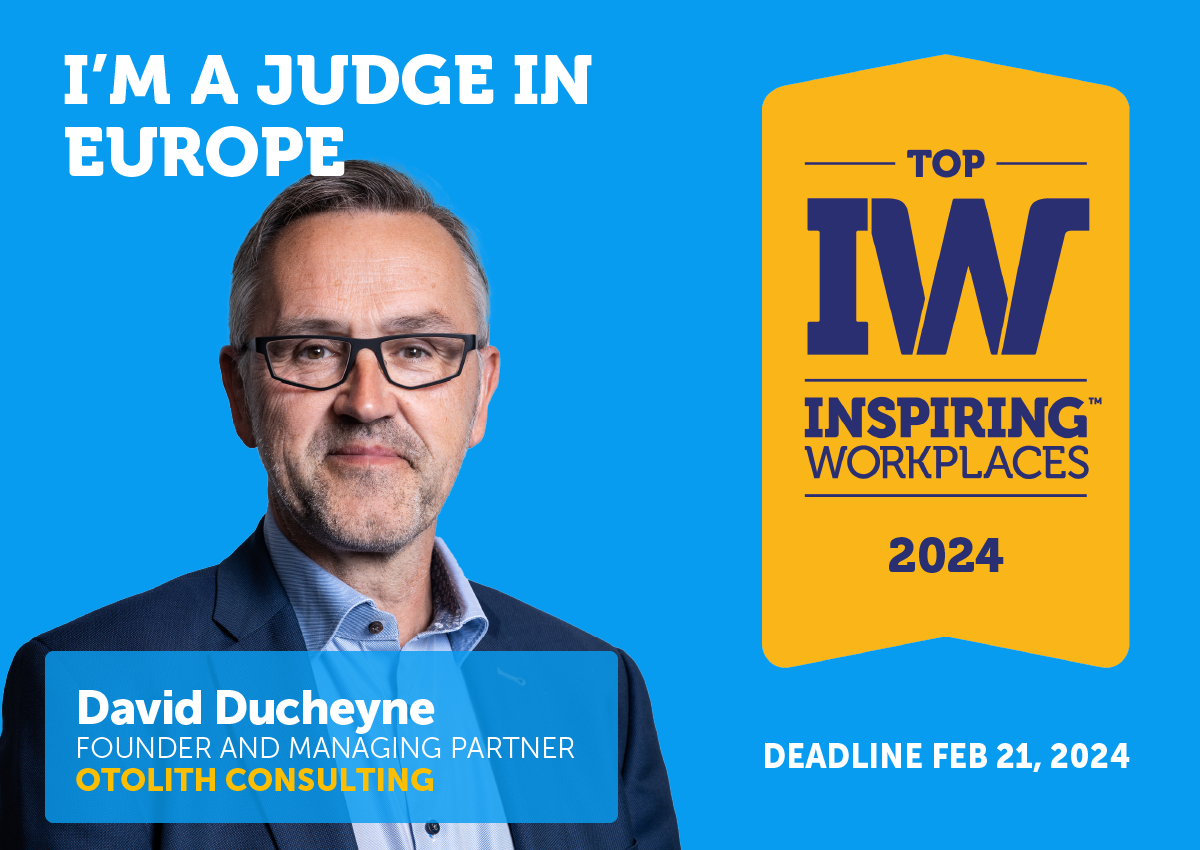
IW: We’re delighted to be joined by one of our judges for the Top Inspiring Workplaces 2024: David Ducheyne. Firstly, What does an Inspiring Workplace mean to you?
Inspiration is always about the future. A workplace inspires when the work contributes to a better future but also when people can build their own future by working there.
That might sound abstract: but imagine working in an organization that does not provide meaningful services or products? What difference can one make? And imagine that working in that place does not get you any further as a person and or a professional? Why would you stay there? For the money? Maybe. And let’s be honest, there is no problem in working to have an income. But if an organization only has the money to motivate you, it is not inspirational.
Inspirational workplaces motivate, they engage, they excite. When working for such a place, there is not a fibre in your body that would question getting up and giving the best version of yourself. An inspirational workplace makes you proud.
IW: You’re a judge for the Top Inspiring Workplaces 2024. What do you hope to see in the entries?
I hope to see a genuine interest in the people working in the place that goes deeper than superficial perks and schemes. Too often, organizations offer a bunch of programs that do not really make a difference. The way an organization treats people is the litmus test for an inspiring workplace. People can work in a dump and be engaged. And they can work in a platinum palace and be disgusted.
IW: Following on from that, What are three areas of focus for organizations looking to improve the people experience?
Sustainable work is the first. It starts there. These are the criteria for that:
- Autonomy: the ability to make decisions independently in the workplace.
- Variety / Diversity: the opportunity to perform different tasks so the work isn’t repetitive and monotonous.
- Task Identity: the chance to deliver a complete product or service. Being responsible for a customer, a project, a process, etc., contributes.
- Task Significance: a job that is meaningful to others (customers) provides energy. Even if the job isn’t always pleasant, meaningfulness helps.
- Feedback and Appreciation: knowing how well I’m doing and how I can improve helps. Appreciation works, too.
- Need for Recovery: the opportunity to rest occasionally, to disconnect. This relates to health.
- Social Support / Belonging: the support received from colleagues and supervisors, as well as from the home front, and the feeling of belonging to a social group is vital.
- Customization: the ability to adapt the job to one’s own needs and capabilities helps people to work with more pleasure. This pertains to person-job fit, but also to finding a balance between resources and demands.
- Trust: the knowledge that one can be vulnerable and make mistakes. This relates to psychological safety. Being oneself and the possibility to speak up are related to this.
- Learning Potential: the opportunity to acquire new skills during the job and feel competent and sustainably employable. This leads to more confidence.
Next to that, it’s all about leadership quality, with at its core the trustworthiness of leaders and psychological safety within the organization. You can call it climate if you will, I would not call it culture. The environment in which people work defines how they feel, what they dare to do, and what they are afraid of. It’s best to get rid of fear and for that leaders need to be trustworthy guardians of the climate. And this does not exclude productivity and performance. Good leaders are able to balance steering and enabling behaviours with a focus on the operations of today and the development for tomorrow. They will be respected and trusted, even when they are demanding and visionary.
And thirdly, it’s about meaningful progress. People need to see progress. They want to see the result of what they do. Inspiring workplaces will visualize the progress people and teams make. They will make sure people see what a difference they make as an individual and how their work benefits their customers, patients, citizens, and stakeholders. They will not focus on shareholder value but will display multistakeholderism.
IW: Leadership plays a huge role in everything we’ve just spoken about. What do you think is the most important quality in a leader?
Do I really have to make one choice? Then it would be empathy. If people can show empathy for their teams and for their customers, they will come a long way. But this requires that can listen and that they are humble. Leaders who focus on their own needs and do not look for the common interest will brutalize their teams.
IW: What’s the best advice you were ever given? Who was it from?
“Play the game but don’t become a pawn”, is one of the better advices have received in the first third of my career.
IW: What’s your advice on how best to engage remote teams?
Install a cadence of encounters, both formal and informal ones. If people cannot meet physically, they need to have fixed moments. But if they can come to the office, organize at least once a week a return day. Social connections are important. People need to have a sense of togetherness.
IW: We are a big believer that fostering psychological safety is an organisational imperative. Do you agree and if so, why?
As I mentioned before, it is crucial. When people feel safe they will be unguarded in their speaking, they will experiment more, and they will have no issue in admitting a mistake. Psychological safety is not a cure for everything. Let’s say it’s about having a just environment where people take responsibility and are accountable for what happens.
IW: 4-Day week – Yes or No?
Not really. Performing all the work in 4 days might be feasible, but it makes work organization more complicated. In areas of production and close customer contacts, it might not be advisable. I know there are positive experiments with it, but we should not only focus on the comfort of the people to have an extra day without loss of income, but also look at the needs of the organization and its customers.
IW: To say we’ve seen a lot of change in the past three years would be an understatement. We want you to get your crystal ball out and predict what will be the top priorities for people choosing an employer over the next 5 years?
Let’s not exaggerate the differences between generations. There have always been changes in behavior but in the end, everybody needs the same: autonomy, security, belonging, achievement, competence. Gen Z is pretty much an invention and once a generation has children and a mortgage, their behaviors become pretty much the same as their parents. This said, younger people do change their jobs more often in the beginning of their career and this is not new. And there seems to be a higher focus on work-life balance (but also the elder generation is moving up the scale). The thing is: you don’t have to go all the way to fulfil all the needs of all the people all of the time. But we can customize work and we should do this for all generations as far as possible.
IW: To say we’ve seen a lot of change in the past three years would be an understatement. We want you to get your crystal ball out and predict what will be the top priorities for people choosing an employer over the next 5 years?
It will be cash, comfort and colleagues.
IW: As a leader how do you empower your people and create a sense of belief and belonging within your culture?
This is a big question. To empower means to give energy and to give space. Or maybe we can give people the energy by giving them the space. I have to come back to my view on inspiring workplaces: creating a context where people can make a difference, can feel safe and see the progress by doing a decent job seems to be the leader’s task and challenge.
A Fun ones to end! Favourite film, album, best song to get you motivated at work, and best place you’ve ever visited and your biggest inspiration:
- Favourite film: Lost in Translation
- Favourite Album: Stop Making Sense by the Talking Heads
- Best song to get you motivated at work: Go against the grain, by Garth Brooks.
- Best place you have ever visited: Lapland.
- Your biggest inspiration: The two midwives who took care of pregnant women who lived in houses that were struck by the plague in 1666 in Bruges. They never got a statue or were given a street name, but they survived the epidemy. They showed compassion, courage and commitment.


